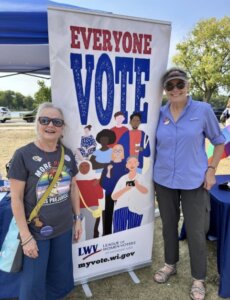League of Women Voters defending democracy
June 7, 2024
| By La Crosse Community Foundation |

Jane Powell, right, of the League of Women Voters of the La Crosse Area staffs a table at Pride in the Park last summer, offering visitors information and assistance on voter registration.
League of Women Voters show the power of social capital
Even after 100-plus years, the League of Women Voters still exemplifies the resilience and collaboration of the suffrage movement that gave it life. Suffrage trailblazers deftly employed social capital, aligning with abolitionists to champion voting rights and racial equality. This legacy of unity and action still inspires the league’s work today as it connects with communities, from local colleges to the Department of Motor Vehicles (yes, the DMV). Their mission —empowering voters and defending democracy — echoes the suffragists’ vision and furthers hope that together, we can shape a more inclusive democracy.
Jane Powell is president of the League of Women Voters of the La Crosse Area.
How did the suffrage movement leverage social capital to be successful?
In the 18th century, suffragists Susan B. Anthony and Elizabeth Cady Stanton worked with abolitionists, Sojourner Truth and Frederick Douglass to support voting rights and racial equality. Civil rights organizations were forming all across the country. In her 1919 address at the National American Woman Suffrage Association’s 50th convention in St. Louis, President Carrie Chapman Catt proposed a “League of women voters to finish the fight and aid in the reconstruction of the nation.” February 14, 1920, six months before the 19th amendment was ratified, the League of Women Voters was formally organized. Catt declared, “The League of Women Voters is not to dissolve any present organization but to unite all existing organizations of women who believe in its principle.…” Locally, on August 22, 1924, Alice Hixon convened the first meeting of what is now the League of Women Voters of the La Crosse Area.
How does representation impact voter turnout and the candidates running for public office?
Historically, youth and people of color have had the lowest percentage of voter turnout. When we talk with people at our registration events, we hear, “Voting doesn’t change my life,” “I don’t like the candidates,” or “I don’t have time to learn enough about the issues/candidates, so I don’t vote.” The league’s mission is to meet those voters where they are and offer them information and assistance so voting happens. Research shows that once a person starts voting, they are more likely to continue voting, and the doors open for even further participation.
What are the greatest challenges and opportunities for building social capital in today’s political landscape?
As we go about our work this year, our biggest challenges are misinformation and disinformation. Therefore, a major portion of our energy is spent on being a source of trustworthy information on candidates, issues and registration. For example, by working with municipal clerks, we contact all local candidates for participation in the Vote411 Voter Guide. Our coordination of events with local colleges and high schools brings us into conversation with students as they realize voting impacts their futures. We offer voter information at the Interstate Fair and summer festivals. And in a new partnership with the Department of Motor Vehicles, league members will assist people as they update their voter registration after they have changed their name or address. As the league and our partners work together in developing an informed, engaged electorate, we will realize a community in which all can thrive. Please learn more and join us at lwvlacrosse.org.
